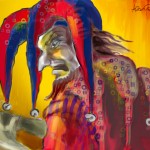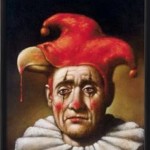
 I don’t know whether this will be successful or not, but I’d like to start a discussion. A character discussion of one of the greatest, most complex of all opera protagonists, Verdi’s Rigoletto. There’s no question that the iconic hunchback is neither fully good nor fully bad; that he has both a light side and a very dark side. I’ve always been
I don’t know whether this will be successful or not, but I’d like to start a discussion. A character discussion of one of the greatest, most complex of all opera protagonists, Verdi’s Rigoletto. There’s no question that the iconic hunchback is neither fully good nor fully bad; that he has both a light side and a very dark side. I’ve always been
able to forgive his dark side because his anguished, loving side arouses such compassion. But recently I’ve read several analyses of the character that, while not unsympathetic, take a much darker view of him. The most recent of those analyses is Michael Handelzalts’s Israeli Opera-related article “Rigoletto: Definitely a pre-feminist opera,” which I’ve retweeted on Twitter. But I’ve found similar sentiments in other performance reviews and essays, too. Even Victor Hugo’s writings about original play Le roi’s amuse (which I haven’t read yet, though I plan to if I can find a good translation) paint a dark picture of the character that startled me when I read it.
I’ve been wondering lately what other casual (or not-so-casual) opera lovers think of Rigoletto; whether they agree with the darker analyses of his personality, or with the more sympathetic view that I’ve always taken. So I’ve written a series of questions, which I hope a few people will attempt to answer. Rigoletto is undoubtedly part villain and part victim, but which of those two qualities is the stronger?
*Victor Hugo, in his preface to Le roi s’amuse, describes the character of Triboulet (Rigoletto) in very dark terms. He calls him “evil,” writes that his hatred of the King (the Duke) and his court is due simply to jealousy, and that the main reason why the King is a depraved seducer is because Triboulet encourages him to be one, using him as “an all-powerful puppet” to dishonor the wives, sisters and daughters of the men he despises. Do you think all this is true of the opera’s Rigoletto as well? Or in the opera, is he a decent man trapped in a corrupt court, who plays along with the depravity of the Duke and co. because he needs to in order to keep his position, all the while regarding them with a loathing they richly deserve? I’ve always seen him as the latter and Hugo’s dark analysis astounded me when I read it.
*“Se iniquo son, per cagion vostra é solo!” – “If I am wicked, the fault is yours alone!” Are we supposed to take these words at face value? Are they what Verdi and Piave wanted us to believe? Or is Rigoletto simply using his deformity and the court’s corruption as weak excuses for his own cruelty?
*Should we sympathize or find fault with Rigoletto’s virtual imprisonment of Gilda? Does he simply not care about her feelings, or is he resorting to desperate yet necessary measures to keep her safe from the corrupt society they live in? Does he truly shelter her out of fear for her safety and welfare, or out of a selfish obsession with preserving her innocence and purity? Do you agree or disagree with Handelzalts’s assertion that, in different ways, both Rigoletto and the Duke treat their women as objects?
*To continue with the above: is Rigoletto’s plot for revenge on the Duke truly for Gilda’s sake, or is he subconsciously only doing it for himself? Does he regard Gilda’s rape chiefly as a wrong done to her, or chiefly in terms of his own grief?
*Might Rigoletto’s extreme secretiveness toward Gilda be a sign that he isn’t her real father, as the Handelzalts article speculates? Or at least might his description of her angelic dead mother be just a fabrication to hide a more lurid story of her birth? Or does Verdi’s achingly lyrical music for that passage make it clear that he’s telling the truth?
*This last question is about the Duke and Gilda, but it raises the issue of whether Rigoletto’s desire for revenge on the Duke is fully justified or not. Does the Duke rape Gilda, or does she willingly give in to him and only regret it afterwards?
Happy discussion (I hope)! 🙂




John
July 11th, 2012 at 21:29
I think Rigoletto is about power. The power of the ruler over subject, of rich over poor and, perhaps especially, men over women. In the opera all these power relations are corrupt and all the characters, except, maybe, Gilda and, even more tenuously, Monterone, are complicit in the corruption. Rigoletto himself is no exception. He panders to the Duke but treats his daughter as a chattel. Does this make him evil? I think “evil” is too strong a word. He’s an ordinary man in a corrupt system. He lacks the qualities needed to transcend it and he makes the compromises most people make in similar positions. He is very ordinarily fallible.